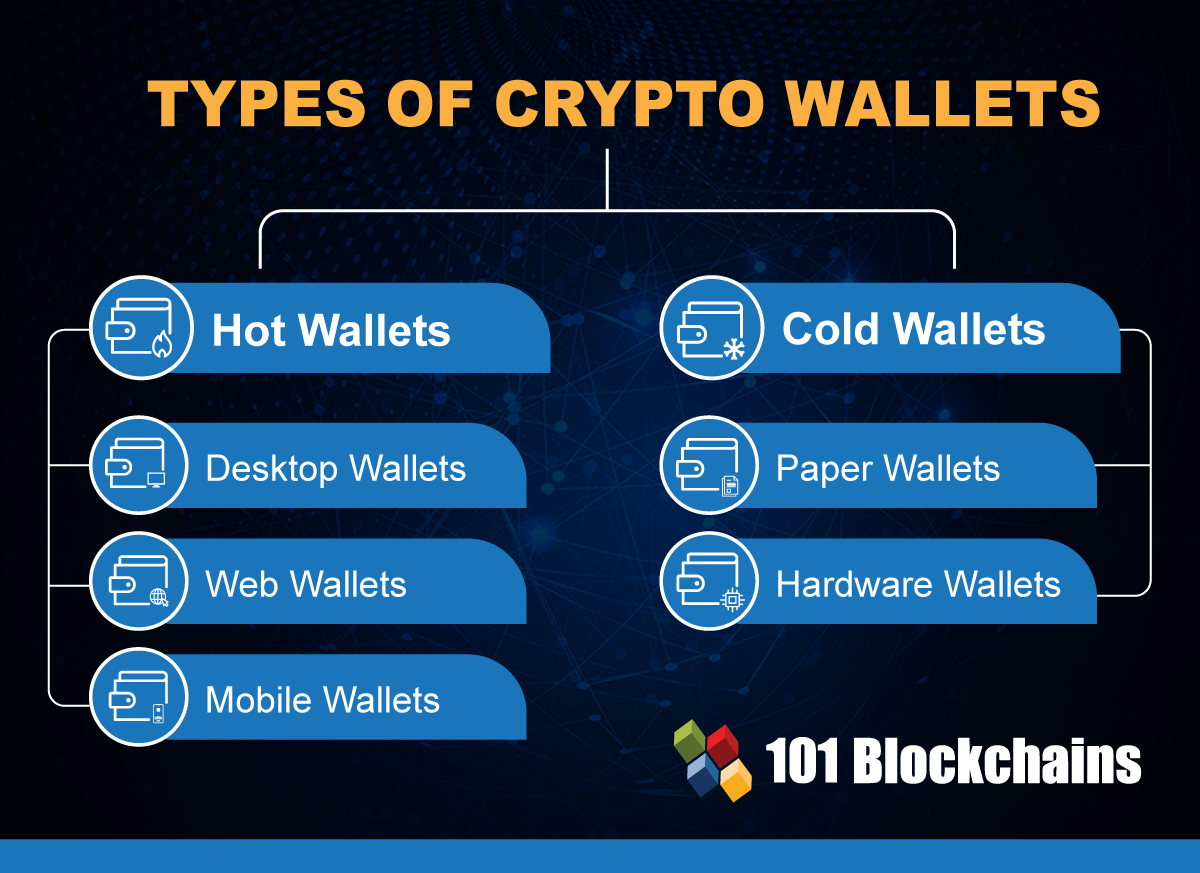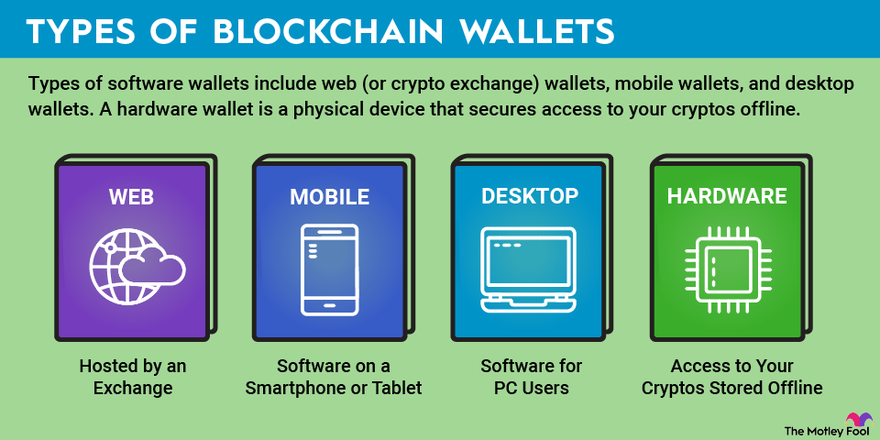There are three main types of crypto wallets: software, hardware, and paper. They can further be classified as cold or hot wallets based on how they operate.
A crypto wallet is crucial for any cryptocurrency user as it is used to interact with a blockchain network securely. We will explore the different types of crypto wallets available in the market and how they operate. Choosing the right crypto wallet is important as it ensures the secure storage and transfer of your digital assets.
Each type of wallet has its own unique features, advantages, and disadvantages, so it’s essential to understand them before selecting the best one for your needs. Let’s begin by exploring what a crypto wallet is and how it works.
Introduction To Crypto Wallets
A crypto wallet is a software tool that allows users to send and receive digital currency and monitor their balance. These wallets are used to interact with a Blockchain network, and they store the user’s public and private keys. Hardware wallets store the user’s private keys on a physical device, while software wallets store them on a digital device or in a cloud-based system. Paper wallets are a physical copy of the user’s private and public keys, printed on a piece of paper and stored in a safe location.
Crypto wallets are important because they provide security to the user’s digital currency holdings, ensuring that only the owner has access to his or her currency. Additionally, crypto wallets allow users to track their transactions and balances in a secure and user-friendly way, making it easier for beginners to manage their digital currency. It is crucial to select the right type of wallet, based on one’s needs and requirements, to ensure proper security and management of digital currency holdings.

Types Of Crypto Wallets
A crypto wallet is a tool used to interact with a Blockchain network. There are three major types of crypto wallets that are commonly used:
- Hardware Wallets: These are electronic devices that store your private keys offline, making them more secure than other types of wallets.
- Software Wallets: These are apps or programs that can be downloaded on your computer or mobile device to store your private keys.
- Paper Wallets: These are physical copies of your private keys that are printed on a piece of paper and stored somewhere safe.
Based on their functionality, crypto wallets can also be further classified as cold or hot wallets. Cold wallets store your private keys offline, making them more secure, while hot wallets store your private keys online, making them more convenient but less secure. It is important to carefully choose the type of wallet that suits your needs.
Hardware Wallets
A crypto wallet is a device or software that is used to store, send, and receive digital currency. There are several types of crypto wallets available, and one of the most secure options available is a hardware wallet. Hardware wallets are physical devices that are used to store digital currency offline, offering a secure solution that is immune to online threats like hacking or phishing attacks.
The definition of hardware wallets is that they are physical devices that store a user’s private keys, allowing them to securely send and receive funds on the blockchain network.
The benefits of using a hardware wallet include enhanced security, ease of use, and the ability to store multiple cryptocurrencies at the same time. That being said, there are some cons to be aware of, including the cost of the device and the fact that they can be lost or stolen.
Overall, if you are looking for a highly secure solution for storing and sending cryptocurrency, then a hardware wallet might be the right option for you.
Software Wallets
Crypto wallets come in different types, including software wallets, which are used to interact with a blockchain network. These wallets can be further classified as hot or cold wallets based on their work. Overall, there are three major types of crypto wallets, namely hardware, software, and paper wallets.
| Definition of Software Wallets: |
| A Software wallet is a digital wallet that enables you to store and manage your cryptocurrencies conveniently. It is software, either a desktop program or a mobile app, accessible from anywhere and at any time. |
| Pros of Using Software Wallets: |
| The major advantage of using software wallets is that they are free to install and easy to use. They offer a high degree of convenience because they can be accessed from anywhere with an internet connection. Moreover, software wallets are ideal for frequent traders, as they provide fast transaction speeds. |
| Cons of Using Software Wallets: |
| However, software wallets have some downsides. For example, they require you to trust the software providers, which means that you may be vulnerable to malware and hacking attacks. Additionally, if you lose access to your device or forget your private key, you can lose all your funds. |
Paper Wallets
A paper wallet is a form of a cold storage crypto wallet that allows a user to store their cryptocurrency in physical form. Essentially, it is a piece of paper with the user’s public and private keys printed on it. The paper wallet stores the information required to access a user’s funds on the blockchain.
One of the pros of using paper wallets is that they are not connected to any online network and hence less susceptible to cyber threats such as hacking and malware. Paper wallets are also easy to generate, and no additional hardware or software needs to be purchased.
However, a paper wallet has its drawbacks as well. It is vulnerable to physical damage, theft or loss. It requires a user to take responsibility for storing the paper securely, protecting it from adverse events like getting wet, burning, or being lost or stolen.
Hot Vs Cold Wallets
Crypto wallets can be classified as either hot or cold wallets. Hot wallets are connected to the internet and more vulnerable to hacking, while cold wallets are offline and considered the safer option for storing cryptocurrency. Understanding the differences between these two types of wallets is crucial when it comes to the security of your cryptocurrency.
Table: Comparison of Hot vs Cold Wallets
| Hot Wallets | Cold Wallets |
| — | — |
| Connected to the internet | Not connected to the internet |
| Less secure | More secure |
| Convenient for frequent transactions | Less convenient for frequent transactions |
| Can be free or low cost | Can be expensive |
| Examples: online wallets, mobile wallets | Examples: hardware wallets, paper wallets |
Explanation of Hot Wallets:
Hot wallets are connected to the internet and are convenient for frequent transactions. They can be free or low cost, allowing easy accessibility to your funds. However, they are less secure than cold wallets due to their online connection.
Explanation of Cold Wallets:
Cold wallets, on the other hand, are not connected to the internet and are therefore more secure. They can be expensive but provide extra protection for your cryptocurrency. Examples of cold wallets include hardware wallets and paper wallets.
Overall, cold wallets provide better security for your cryptocurrency, but hot wallets offer convenience for frequent trading. It’s important to consider your needs and risks when choosing which type of wallet to use.
Choosing A Crypto Wallet
A crypto wallet is an essential item for anyone looking to interact with a blockchain network. When choosing a wallet, there are a few factors to consider, such as security, ease of use, and the type of cryptocurrency you are dealing with. Popular crypto wallets include Coinbase, Crypto.com, Binance, and MetaMask.
Hardware wallets are the most secure type of crypto wallet as they store the private keys offline. Software wallets, on the other hand, are usually free and easy to use, but may not be as secure. Paper wallets are also an option, but are not recommended for beginners.
It’s important to understand the difference between cold and hot wallets. Cold wallets are offline wallets and are considered the safest, while hot wallets are connected to the internet and are more vulnerable to hacking.
When it comes to setting up a wallet, follow the step-by-step instructions provided by the wallet provider. Make sure to keep your private keys and seed phrases safe and secure, and always double-check the recipient address when sending crypto.

How To Secure Your Crypto Wallet
Discover the different types of crypto wallets and learn how to secure them to protect your digital assets. Hardware, software, and paper wallets are the three major types that can be further categorized as cold or hot wallets. Keep your private keys safe and choose the right blockchain network for your crypto transactions.
A crypto wallet is the most important aspect of your cryptocurrency journey, as it is the key to access your funds. Security considerations are paramount, as your crypto wallet holds all of your virtual assets. Importance of Securing Your Wallet includes using strong passwords and Two-Factor Authentications, keeping your private key in a secure location, avoiding sharing your private key with anyone, and keeping your wallet software up to date.
Best Practices for Securing Your Wallet involve using strong antivirus software, avoiding public Wi-Fi networks, and backing up your wallet in multiple locations such as USB drives or hard drives. It is recommended to use cold storage wallets for long term storage and hot wallets for frequent use. Understanding Types of Crypto Wallets Explained can assist you in choosing the right kind of wallet that suits your needs, whether it is a hardware wallet, a software wallet, or a paper wallet.
Frequently Asked Questions Of Types Of Crypto Wallets Explained
What Are The 3 Types Of Crypto Wallets?
There are three types of crypto wallets: hardware, software, and paper wallets. These can also be categorized as hot or cold wallets depending on their working mechanism. Hot wallets are connected to the internet while cold wallets are offline.
What Are The Three Classification Of Bitcoin Wallets?
Bitcoin wallets can be classified into three types, namely paper wallets, software wallets, and hardware wallets. These wallets can further be categorized as hot or cold wallets depending on their operation.
What Kind Of Crypto Wallet Is Best?
The best kind of crypto wallet depends on individual requirements. Hardware, software, and paper wallets are the major types with further classification of cold or hot wallets. Coinbase Wallet, Trezor Model T, and Ledger Nano X are some of the best options with distinct features.
What Are The Different Types Of Crypto Hardware Wallets?
There are hardware, software, and paper wallets that can be classified further as hot or cold wallets depending on their work. Hardware wallets are the most secure type of wallet that uses physical devices like USB drives to store private keys.
Conclusion
A crypto wallet is an essential tool for anyone looking to interact with Blockchain networks. As we have seen, there are different types of crypto wallets available, each with its unique benefits and drawbacks. When choosing a crypto wallet, it’s crucial to consider factors such as security, convenience, and accessibility.
By understanding the different types of crypto wallets and their features, you can make an informed decision on which one to use. Always prioritize security when it comes to storing your crypto assets and stay informed about the latest security measures.

